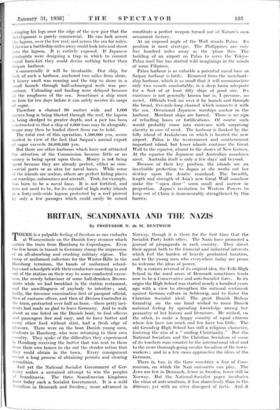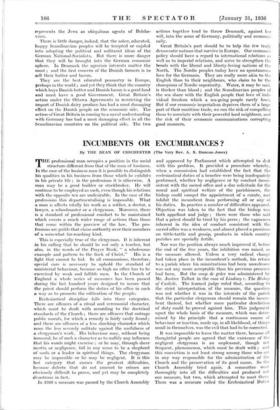BRITAIN, SCANDINAVIA AND THE NAZIS
By PROFESSOR N. de M. BENTWICH THERE.is a palpable feeling of freedom as one embarks at Warnemiinde on the Danish ferry steamer which carries the train from Hamburg to Copenhagen. - Even the few hours in. transit in Germany stamp the impression of an all-absorbing and crushing military regime. The troop of uniformed collectors for the Winter-Hilfe in .the Hamburg terminus, the bands of uniformed school- boys and schoolgirls with their conductors marching in and out of the station on their way to some conducted excur- sion, the rowdy behaviour. of some half-drunken Brown- shirts while we had breakfast in the station restaurant, and the unwillingness of . anybody to interfere ; and, lastly, the tiresome examination first of passport official, then of customs officer, and then of Devisen Controller in the train, protracted over half an hour,—these petty inci- dents had made us glad to leave Germany. And to walk about as one listed on the Danish boat, to find officers and passengers free and easy, and to have butter and every other food without stint, had a fresh edge of pleasure. There were on the . boat Danish . young men, 1,tudents ;in, Hamburg, who were .returning to their own country. They .spoke of the difficulties, they experienced in Hamburg receiving the butter that was sent, to them from their own homes to eke out the slender ration that they could obtain in the town. Every consignment meant a long process of obtaining permits and clearing formalities. • And yet the National Socialist Government of Ger- many makes a sustained attempt to win the peoples of Scandinavia. The three -Scandinavian kingdoms have today each a Socialist Government.. It is a mild Socialism in Denmark and Sweden ; more advanced in Norway, though it is there for the first time that the Socialist Party holds office. The Nazis have promoted a journal of propaganda in each country. They direct their appeal both to the financial and industrial interests which feel the burden of heavily graduated taxation, and to the young men who everywhere today are prone to welcome the ideas of power.
By a curious reversal of its original idea, the Folk-High School in the rural areas of Denmark sometimes tends now to be a Conservative and anti-Socialist force. In its origin the High School was started nearly a hundred years ago with a view to strengthen the national sentiment against German culture in Schleswig, and to foster the Christian Socialist ideal. The great Danish Bishop Grundvig on the one hand wished to rouse Danish national feeling by spreading knowledge among her peasantry of her history and literature. He wished, on the other, to make a happy country of equal citizens where few have too much and few have too little. The old Grundvig High School has still a religious character, fostering the aim of a " smiling Christianity." But the National Socialism and the Christian Socialism of some of its teachers runs counter to the international ideal and to the more thorough-going secular Socialism of the town- workers ; and in a few cases approaches the ideas of the Germans.
There is, too, in the three countries a fear of Com- munism, on which the Nazi emissaries can play. The Jews are few in Denmark, fewer in Sweden, fewer still in Norway. But the National-Socialist paper inculcates the virus of anti-semitism, if less shamelessly than in the Stunner. yet with an utter disregard of facts. And it represents the Jews as ubiquitous agents' of Bolshe- vism.
There is little danger, indeed, that the sober, educated, happy Scandinavian peoples will be tempted or cajoled into adopting the political and militarist ideas of the German National-Socialists. But there is more danger that they will be brought into the German economic sphere. In Denmark the agrarian interests matter the most ; and the first concern of the Danish farmers is to sell their butter and bacon. • • They are the best educated peasantry in Europe, perhaps in the world ; and yet they think that the country which buys Danish butter and Danish bacon is a good land and must have a good Government. Great Britain's action under the Ottawa Agreements in restricting the import of Danish dairy produce has had a most damaging effect on the Danish people on the economic side. The action of Great Britain in coming to a naval understanding with Germany has had a most damaging effect in all the Scandinavian countries on the political side. The two actions together tend to throw Denmark,' against her will, into the arms of Germany, politically and economi- cally.
Great Britain's part should be to help the few truly democratic nations that survive in Europe. Our economic policy should have a regard to international relations as well as to imperial relations, and serve to strengthen the bonds with the liberal and liberty-loving nations of the North. The Nordic peoples today have no spontaneous love for the Germans. They are really more akin to the English than to their neighbours, who claim to be the champions of Nordic superiority. Water, it may be said, is thicker than blood ; and the Scandinavian peoples of the sea share with the English people that love of indi- vidual freedom which a sea-going people rarely loses. But if our economic imperialism deprives them of a large part of their maritime trade, we run the-risk of compelling them to associate with their powerful land neighbour, and the risk of their economic communications corrupting good manners.











































 Previous page
Previous page